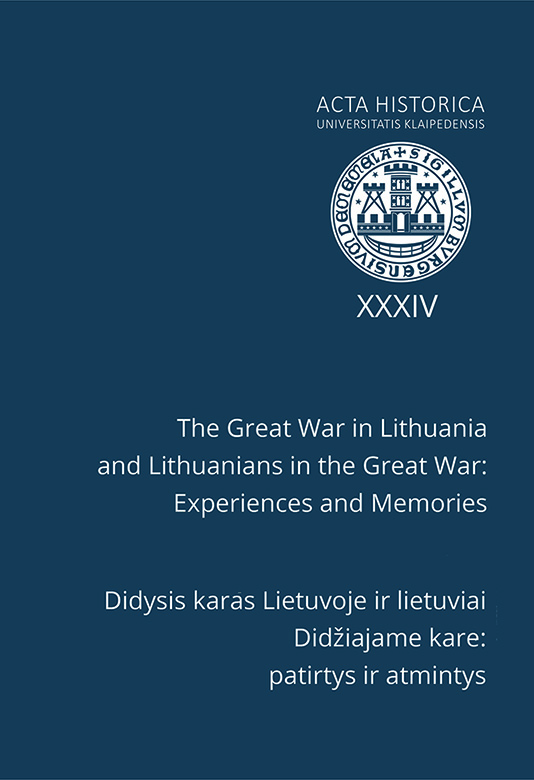Volume 34 (2017): The Great War in Lithuania and Lithuanians in the Great War: Experiences and Memories = Didysis karas Lietuvoje ir lietuviai Didžiajame kare: patirtys ir atmintys, December 2017

Order by:
Pub. online: 15 Dec 2017
Type: Editorial Note
 Open Access
Open Access
Journal:
Acta Historica Universitatis Klaipedensis
Volume 34 (2017): The Great War in Lithuania and Lithuanians in the Great War: Experiences and Memories = Didysis karas Lietuvoje ir lietuviai Didžiajame kare: patirtys ir atmintys, pp. 5–6
Pub. online: 15 Dec 2017
Type: Review Article
 Open Access
Open Access
Journal:
Acta Historica Universitatis Klaipedensis
Volume 34 (2017): The Great War in Lithuania and Lithuanians in the Great War: Experiences and Memories = Didysis karas Lietuvoje ir lietuviai Didžiajame kare: patirtys ir atmintys, pp. 7–20
Pub. online: 15 Dec 2017
Type: Review Article
 Open Access
Open Access
Journal:
Acta Historica Universitatis Klaipedensis
Volume 34 (2017): The Great War in Lithuania and Lithuanians in the Great War: Experiences and Memories = Didysis karas Lietuvoje ir lietuviai Didžiajame kare: patirtys ir atmintys, pp. 21–32
Pub. online: 15 Dec 2017
Type: Article
 Open Access
Open Access
Journal:
Acta Historica Universitatis Klaipedensis
Volume 34 (2017): The Great War in Lithuania and Lithuanians in the Great War: Experiences and Memories = Didysis karas Lietuvoje ir lietuviai Didžiajame kare: patirtys ir atmintys, pp. 35–60
Abstract
Pub. online: 15 Dec 2017
Type: Article
 Open Access
Open Access
Journal:
Acta Historica Universitatis Klaipedensis
Volume 34 (2017): The Great War in Lithuania and Lithuanians in the Great War: Experiences and Memories = Didysis karas Lietuvoje ir lietuviai Didžiajame kare: patirtys ir atmintys, pp. 61–78
Abstract
Pub. online: 15 Dec 2017
Type: Article
 Open Access
Open Access
Journal:
Acta Historica Universitatis Klaipedensis
Volume 34 (2017): The Great War in Lithuania and Lithuanians in the Great War: Experiences and Memories = Didysis karas Lietuvoje ir lietuviai Didžiajame kare: patirtys ir atmintys, pp. 81–99
Abstract
Pub. online: 15 Dec 2017
Type: Article
 Open Access
Open Access
Journal:
Acta Historica Universitatis Klaipedensis
Volume 34 (2017): The Great War in Lithuania and Lithuanians in the Great War: Experiences and Memories = Didysis karas Lietuvoje ir lietuviai Didžiajame kare: patirtys ir atmintys, pp. 101–122
Abstract
Pub. online: 15 Dec 2017
Type: Article
 Open Access
Open Access
Journal:
Acta Historica Universitatis Klaipedensis
Volume 34 (2017): The Great War in Lithuania and Lithuanians in the Great War: Experiences and Memories = Didysis karas Lietuvoje ir lietuviai Didžiajame kare: patirtys ir atmintys, pp. 125–146
Abstract
Pub. online: 15 Dec 2017
Type: Article
 Open Access
Open Access
Journal:
Acta Historica Universitatis Klaipedensis
Volume 34 (2017): The Great War in Lithuania and Lithuanians in the Great War: Experiences and Memories = Didysis karas Lietuvoje ir lietuviai Didžiajame kare: patirtys ir atmintys, pp. 147–163
Abstract
Pub. online: 15 Dec 2017
Type: Article
 Open Access
Open Access
Journal:
Acta Historica Universitatis Klaipedensis
Volume 34 (2017): The Great War in Lithuania and Lithuanians in the Great War: Experiences and Memories = Didysis karas Lietuvoje ir lietuviai Didžiajame kare: patirtys ir atmintys, pp. 165–185
Abstract